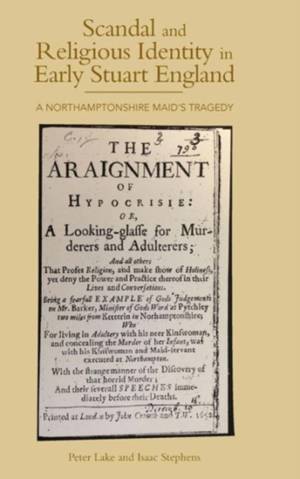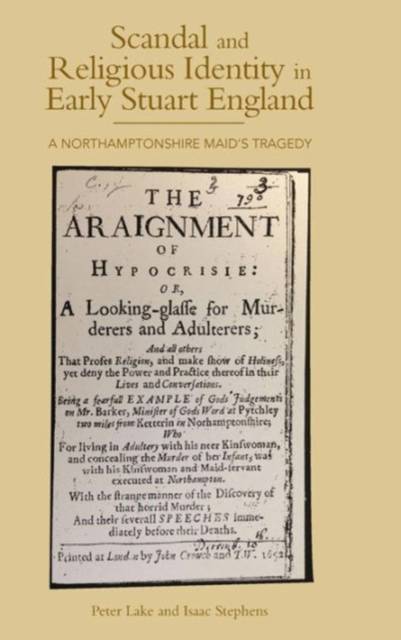
En raison d'une grêve chez bpost, votre commande pourrait être retardée. Vous avez besoin d’un livre rapidement ? Nos magasins vous accueillent à bras ouverts !
- Retrait gratuit dans votre magasin Club
- 7.000.000 titres dans notre catalogue
- Payer en toute sécurité
- Toujours un magasin près de chez vous
En raison de la grêve chez bpost, votre commande pourrait être retardée. Vous avez besoin d’un livre rapidement ? Nos magasins vous accueillent à bras ouverts !
- Retrait gratuit dans votre magasin Club
- 7.000.0000 titres dans notre catalogue
- Payer en toute sécurité
- Toujours un magasin près de chez vous
Scandal and Religious Identity in Early Stuart England
A Northamptonshire Maid's Tragedy
Peter Lake, Isaac Stephens
257,95 €
+ 515 points
Description
A window into the mental and cultural worlds of the Stuart period, capturing the existing religious, social and political tensions on the eve of the English Civil War. This book starts with an extraordinary event and document. The event is the trial and execution for infanticide of a puritan minister, John Barker, along with his wife's niece and their maid, in Northampton in 1637; the document, what appears to be a virtual transcript of Barker's last speech on the gallows. His downfall soon became polemical fodder in scribal publications, with Puritans circulating defences of Barker and anti-Calvinists producing a Laudian condemnation of the minister. Scandal and Religious Identity in Early Stuart England uses Barker's crime and fate as a window on the religious world of early modern England. It is based upon an extraordinary deposit of manuscript and printed sources, all produced between 1637 and 1640 by people living in close proximity to one another and all of whom knew one another, either as friends or more often as enemies. Marshalling evidence frompublic polemical sources and from almost entirely private ones - a diary, private letters and a spiritual autobiography - the book is able to examine the same events and persons, and beliefs and practices, from multiple perspectives: the micro and the macro, the personal and the political, and the affective and the doctrinal. Throughout, we meet a range of very different people putting various bodies of religious theory into practice, connecting the most local and particular of events and rivalries to the great issues of the day and responding, in certain cases, to the promptings of the Holy Spirit and the temptations of the devil.
This approach enables a whole series of generalisations to be explored: about the relation between politics and religion, devotion and polemic, puritans and their enemies, local and national affairs; between rumour, manuscript and print; and, finally, about gender hierarchyand the social roles of men and women. The result is an extraordinarily detailed and intimate portrait of the religio- political scene in an English county on the eve of civil war. PETER LAKE is Distinguished University Professor of early modern English history at Vanderbilt. He is the author of several studies of English religion, culture and politics in the Elizabethan and early Stuart periods. ISAAC STEPHENS is Assistant Professor of History at Saginaw Valley State University and has published on early modern marriage, religion, and life-writing.
This approach enables a whole series of generalisations to be explored: about the relation between politics and religion, devotion and polemic, puritans and their enemies, local and national affairs; between rumour, manuscript and print; and, finally, about gender hierarchyand the social roles of men and women. The result is an extraordinarily detailed and intimate portrait of the religio- political scene in an English county on the eve of civil war. PETER LAKE is Distinguished University Professor of early modern English history at Vanderbilt. He is the author of several studies of English religion, culture and politics in the Elizabethan and early Stuart periods. ISAAC STEPHENS is Assistant Professor of History at Saginaw Valley State University and has published on early modern marriage, religion, and life-writing.
Spécifications
Parties prenantes
- Auteur(s) :
- Editeur:
Contenu
- Nombre de pages :
- 403
- Langue:
- Anglais
- Collection :
- Tome:
- n° 32
Caractéristiques
- EAN:
- 9781783270149
- Date de parution :
- 21-05-15
- Format:
- Livre relié
- Format numérique:
- Genaaid
- Dimensions :
- 156 mm x 234 mm
- Poids :
- 739 g

Les avis
Nous publions uniquement les avis qui respectent les conditions requises. Consultez nos conditions pour les avis.






